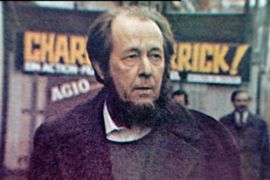Russian author Solzhenitsyn dies
Russian Nobel prize winner was one of the most prominent dissidents in the Soviet era.

He was born on December 11, 1918, studied physics and mathematics at Rostov University and became a Soviet army officer after Hitler’s invasion in 1941.
Solzhenitsyn’s experience in the network of labour camps was vividly described in his book, One Day in the Life of Ivan Denisovich.
His major works, including The First Circle and Cancer Ward, brought him world admiration and the 1970 Nobel Literature Prize.
Solzhenitsyn was stripped of his citizenship and sent into exile in 1974 after the publication of The Gulag Archipelago, his monumental history of the Soviet police state.
He settled in the US, returning to post-Soviet Russia as a hero in 1994.
Denounced communism
Martin McCauley, a leading author on Eastern Europe and the Soviet era from the University of London, told Al Jazeera that Solzhenitsyn was “a figure of the 20th century”.
“He denounced communism and Stalinism at a time when if you did you were liable to end up in a Gulag [Soviet Union prison camp],” McCauley said.
“Solzhenitsyn was so important that the Soviets deported him to West Germany, because that was the only way to deal with him, as they couldn’t put him in a Gulag because he was too well-respected and known in the West.
“After moving to the United States, where he was well-liked and admired, he came to find American society too materialistic and one that had moved away from God.”
McCauley said when Solzhenitsyn moved back to Russia, invited by Mikail Gorbachev, the then Russian president, his citizenship was restored and he became greatly admired.
“More recently, the younger generation have not really accepted him … He was a figure of the 20th century really”.